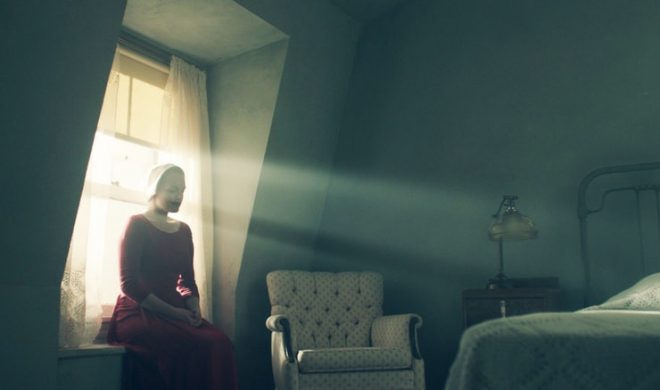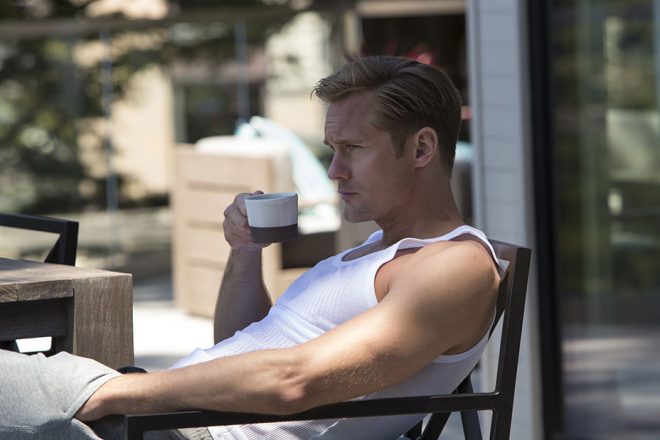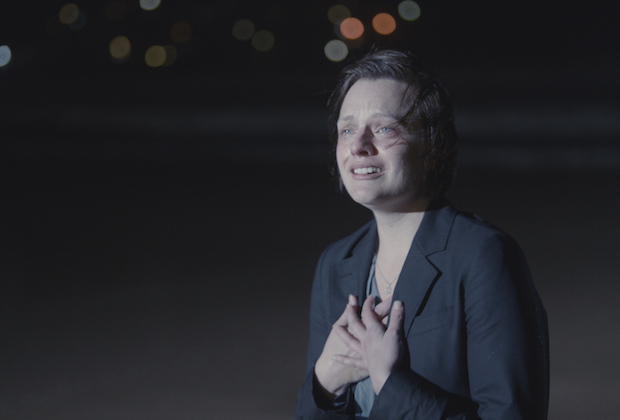‘Top Of The Lake’ Is One Of 2017’s Most Terrifying Interrogations Of Toxic Men
The series hits scarily close to home.

You might not remember all the details of Top Of The Lake‘s murky, radical first season, created by auteur Jane Campion for the BBC. Most of my memories are vivd images: a dark green forest swathing a pregnant, gun-toting child; a campsite of middle-aged nudists on the edge of a vast lake; sheer cliffs cut out against a slate sky. And, of course, the icy blue eyes and sharp, familiar features of Elisabeth Moss, who plays enigmatic police detective Robin Griffin.
The second season, Top Of The Lake: China Girl, has arrived four years after the first, and Robin has relocated from the wilds of remote New Zealand to the brittle, claustrophobic eastern suburbs of Sydney. China Girl has none of the lush expansiveness of that first season, but the series is toothier and more outlandish for it. Reviews have called China Girl “prickly” and “convulsive”, “dark”, even “ugly”.
It is ugly, both in its look and its subject: the suspicious death of an Asian sex worker whose body has washed up on Bondi Beach.
Like the first series (and a great deal of Campion’s work) China Girl tackles tricky contemporary gender relations with unflinching and sometimes grotesque honesty. The sketch Campion marked out in season one — of cruel men and resilient women — has been etched more boldly and permanently on China Girl. The men of Campion’s Sydney are almost uniformly horrific; the women struggling for survival against their unfailing toxicity.
This noxious thread rips through the wildly affecting season via Campion’s determined female gaze. It’s explicitly not about the way men see each other (or themselves). In China Girl, we look through women’s eyes at the men around them… and those men are monsters.
The Dangerous Men Of TV’s Golden Age
Campion is by no means the first TV auteur to tackle the perilous patriarchy in her work. She’s also not the first to address the male condition through the noir crime aesthetic.
Earlier this year, Chris Chibnall used the final season of his cruelly beautiful Broadchurch to take aim at dangerous machismo, which sees men destroying women (and themselves) as they grasp for power. The toxicity of the men in the show’s third season was so pronounced that in one episode the lead (played by David Tennant) pointedly pronounced, “You know what’s bothering me about this case? It makes me ashamed to be a man.”
The way masculine toxicity affects our society is, of course, a somewhat controversial subject. However, where previously toxic men bolstered by the patriarchy — your Tony Sopranos, Don Drapers and Walter Whites — appeared on television with less external interrogation and, at times, far too much self-motivated soul-searching; now, more and more dramatic television and film is focused on the potential devastation of machismo on all of us.

Some of the most popular series this year have zeroed in on the damage performative masculinity can do. In The Handmaid’s Tale, Hulu’s TV adaptation of Margaret Atwood’s searing (albeit imperfect) dystopian horror, fundamentalist neo-conservative men rule and women are variously subjugated by their whims. Many viewers reacted to that series like a long-overdue warning: look what can happen if we do not address this gendered disparity. Though some have eloquently argued, in the show’s aftermath, that the message is both too little and too late. (It’s interesting to note that Elisabeth Moss is also the star of Handmaid, lending her intense and impressive technique to another difficult and traumatising role.)
One of the most disturbing TV performances so far this year — one somewhat overshadowed by the uniformly excellent female performances — was Alexander Skarsgard as an abusive husband, Perry, in Big Little Lies. Skarsgard, who is known for playing the devilish Eric in Alan Ball’s True Blood, utterly transforms as Perry, whose abuse of his wife Celeste (a fragile, exquisite Nicole Kidman, who oddly enough also features in China Girl) is the show’s most sickening and captivating element.
It’s terrifying how Perry’s abuse is inextricably linked to his conception of his own masculinity. There is no scarier moment on the show than when Celeste lashes out at Perry’s erect penis during an attack. He shoots her a thunderous look as he registers how she’s rendered his very manhood inept.
Fractured masculinity, and how violently men can reinforce it to those who challenge them, becomes the toxic thread that runs through the entire season.

In China Girl, dangerous men lurk in virtually every frame of Campion’s sunsoaked series. There are the noxious, though still threatening Male Trolls, who camp out in a scummy Sydney cafe, rating sex workers online and casually sexually harassing the waitress who serves them. There’s the male-dominated police force, including the somewhat hopeless but unnervingly erratic detective who has designs on Robin. And there’s “Puss”, the dishevelled, smart-mouthed English tutor who lives above a local brothel and exploits, at various turns, the sex workers, Robin, and Robin’s teenage daughter Mary (Alice Englert).
These threatening men are everywhere — at work, on the street and in the bedroom — and they’re viewed through an unflinchingly female gaze in both China Girl and Big Little Lies. As a result, they are less shadowy spectres of danger and more very real ticking bombs, present, close and poised for destruction.
Is The Female Survivalist Narrative A Cliche?
Top Of The Lake, despite its noir-ish trappings, is a survivalist tale first and a detective yarn second. Everywhere the show aims its lens, in both seasons, there are women struggling to survive against the tyranny of men and masculinity.
In season one, that violent male dominance is epitomised by the brutish Mitcham family, the unofficial leaders of Laketop. At the very head of the family (and, by proxy, the whole of Laketop) is the tyrannical patriarch Matt Mitcham. Matt oppresses the women of Laketop in myriad disturbing ways, but it turns out that violence lurks in the Laketop police force too, in which the repugnant Al (David Wenham) is abusing his power to rape and harm young women in his care.
Robin’s trauma and survival are nails that the show hammers deep into you.
Violence and oppression covers Laketop like a thick, itchy blanket and at the centre is Robin, who is sorting through the trauma of a brutal gang rape she survived as a teenager. In many ways Robin is the archetypical Strong Trauma Survivor who has dominated the TV landscape in recent years. Her trauma and survival are nails that the show hammers deep into you. Her journey is the tenuous thread that connects the first season to the second.
When Robin reconnects with her biological daughter, Mary — who is in grave danger with her abusive boyfriend Puss — Robin’s desperation to rescue Mary without pushing her away becomes the show’s most painful barb. Even when Puss attacks Robin, she does not press charges (at Mary’s request). She doesn’t fight back — at least not until much later. Trauma and male violence becomes the unpleasant conduit for Robin and Mary’s fledgling relationship. As in many depictions of the catastrophic effects of male violence, in China Girl it is a experience shared.
For better or worse, it binds women to one another.

Big Little Lies also increasingly focused on the ways inescapable male violence can bond and connect women. In just seven episodes the series captured the attention of legions of viewers, both male and female, for its startling meditation on the “utterly natural rendering of violence as an ordinary part of women’s lives“.
This violence, both sickening and sickeningly authentic, is almost exclusively carried out by men against women, and it is the lynchpin around which the series (and its captivating characters) pivots. As the show’s heart-bursting finale shows us, the way women channel that trauma into strength and healing is striking.

I’m not sure I’m entirely convinced by a legion of female characters bolstered by trauma and male violence. Though each of these shows is vital and resonant for how they illuminate the way masculinity harms women (and men), I can’t help but feel the trope of the Stoic Trauma Survivor is a little tacky and played out.
We’ve seen her before in Jessica Jones, in Game Of Thrones, in Scandal, even in The Keepers, Netflix’s stunning (but rough) true-crime documentary about the largely female survivors of a Baltimore church scandal. As a survivor myself, it’s hard for me to reckon with this idea that, for women, trauma is just a pathway to strength and resilience, as it is sometimes represented by women on television. At the same time, surviving trauma is a unique and powerful experience, and finding other people (whether real or imagined) who have done the same can have a healing effect.
It’s this effect I felt as I watched the women of Big Little Lies come together. I felt it when justice was served for survivor Trish on Broadchurch. And I did feel it in China Girl, when I saw how connecting with her daughter, reclaiming her independence, and finding solace in her own strength helped to reform some of Robin’s broken self. This is not a unique experience, it’s not a niche. So many real women have been touched by the tyranny of male violence. Though not always comfortable to view, these series do some cathartic illumination and interrogation of our desperate struggle against toxic masculinity.
Characteristic of Campion’s resistance to easy filmmaking, China Girl is not a neat resolution for Robin, but she’s certainly on the twisty road to recovery. In this way, the series is one of the definitive depictions of trauma survival on television. And so, for me at least, Top Of The Lake remains one of the most searing and terrifying portraits of our modern world — one where we are all held to ransom by male toxicity, clawing for survival. It’s not always pretty to watch, but it’s authentic, and that veracity rings right through Campion’s startling series.
—
Top Of The Lake: China Girl is screening now on BBC First, and is available to stream on Foxtel Now.
—
Matilda Dixon-Smith is Junkee’s Staff Writer. She tweets at @mdixonsmith.



